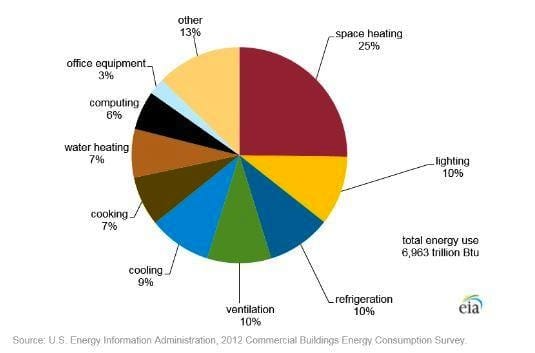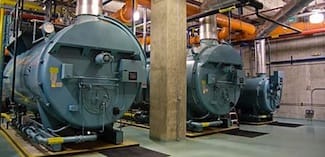The U.S. Department of Energy (DOE) finalized a new energy efficiency standard yesterday for “packaged boilers” that heat commercial and multifamily buildings, which will save consumers and businesses billions of dollars on their heating bills.
Nearly a quarter of the commercial floor space in the United States is heated by packaged boilers and given that space heating is by far the biggest energy user in these and other commercial buildings (see red wedge in picture below), the standard will trigger a significant amount of savings. Commercial packaged boilers, which are also found in multifamily buildings and small industrial facilities, are powered by oil or natural gas and generally serve buildings and facilities with central distribution systems that circulate the steam or hot water from the boiler to other parts of the building. These boilers can fit in tight spaces and be installed relatively quickly.
Energy Information Agency
This energy efficiency standard was among five released by DOE yesterday. Others were announced for pool pumps, portable air conditioners, uninterruptible power supplies (battery backup systems that automatically kick in to keep electronics running when the power goes out or falters); and walk-in coolers and freezers found in supermarkets and restaurants across America. All were released in line with the legal process for establishing energy efficiency standards or their regularly scheduled review for strengthening, which is part of a federal standards program saving Americans money since the bipartisan enactment of the National Appliance Energy Conservation Act of 1987 signed into law by President Reagan.
Although DOE announced the new standards, their effective date occurs three years after their official publication in the Federal Register. The standards will not be published for at least 45 days to provide time to make any necessary technical corrections. The 45 day review period only permits correction of technical errors; it doesn’t allow for the weakening of a standard.
The standard approved yesterday will save 0.27 quadrillion BTU (quads) of energy once it goes into effect in 2019, enough to heat all the natural gas-heated homes in New England for a year and a half, and save consumers up to about $2 billion after accounting for the cost of the new equipment.
A DOE analysis estimates the new standards will save consumers between $200 (for a small gas-fired steam boiler) and $36,000 (for a large oil-fired boiler), over the life of the boilers with a payback of 10.1 years and 2.8 years, respectively. These payback periods are a fraction of the 25-year lifetime of the average packaged boiler.
Per DOE estimates, commercial boilers sold over the next 30 years meeting the new standards will save $0.5 to nearly $2 billion in net savings for customers nationwide, depending on the interest rate assumed. This standard will reduce the energy use of commercial packaged boilers by between 2 and 6 percent compared to the current standard and will avoid roughly 16 million metric tons of carbon dioxide emissions over the next 30 years. This is as much carbon pollution as is emitted by more than 3 million cars driven for a year!
The DOE’s new rules will raise the required boiler efficiency from the current level of 80 percent to between 81 to 88 percent. With this improvement, the boilers will convert more of the incoming fuel to useful heat. The standards are technology neutral so manufacturers have complete control over how they meet these targets, whether by improving the heat exchanger, using improved burner technology, or a variety of other technology options considered by DOE.
While the new standards will certainly save a significant amount of money for consumers and businesses and reduce harmful carbon pollution, DOE missed an opportunity to adopt more stringent standards that would have led to even greater benefits—more than doubling the energy savings to 0.8 quads and up to $3.2 billion in net savings over 30 years. DOE said it considered more stringent energy efficiency levels as possible standards but concluded that the potential burdens of those energy efficiency levels to certain consumers would outweigh the projected benefits.
We’ll keep working with DOE in the future to improve energy conservation standards for commercial packaged boilers, for greater savings to consumers and benefit to the environment.
So big picture, starting in late 2019, you can rest assured that the heating system in your commercial building, school, or multifamily building will make you nice and toasty, while cutting energy bills. That’s a great deal for our pocketbooks and the environment too.
 Lauren Urbanek is Senior Energy Policy Advocate, Energy & Transportation program for the National Resources Defense Council (NRDC); she focuses on reducing the energy consumption of homes and businesses through improved energy codes and equipment standards. Prior to joining NRDC, she worked on energy policy at the Maryland Energy Administration, where she managed the state’s EmPower Maryland initiative. She holds a bachelor’s degree in civil and environmental engineering from the University of Maryland and a master’s degree in city and regional planning from the University of Pennsylvania. She is based in NRDC’s Washington, D.C., office.
Lauren Urbanek is Senior Energy Policy Advocate, Energy & Transportation program for the National Resources Defense Council (NRDC); she focuses on reducing the energy consumption of homes and businesses through improved energy codes and equipment standards. Prior to joining NRDC, she worked on energy policy at the Maryland Energy Administration, where she managed the state’s EmPower Maryland initiative. She holds a bachelor’s degree in civil and environmental engineering from the University of Maryland and a master’s degree in city and regional planning from the University of Pennsylvania. She is based in NRDC’s Washington, D.C., office.






Join the conversation: